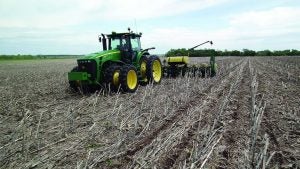Fact: Climate change is real.
Another fact: Al Gore was a terrible water carrier for this issue.
There. I said it. Climate change is actually happening. We can argue about the details later. We can fight about whether it’s fair for the U.S. to take action while China and India continue polluting (it isn’t). We can debate whether it’s realistic to think our ever-changing planet will forever support a human-friendly climate (it won’t). And we can all admit Greta Thunberg is too angry for someone so young (sorry, not sorry).
But here’s the deal: U.S. farmers will either contribute to the climate-change discussion or be forced to implement the solution.
We still have an opportunity to step up and influence policy. We can take a seat at the table and share our expertise. We can lead. Or we can wait for the government to tell us what production methods we’re going to implement to reduce our carbon footprint. We can wait for misguided bureaucrats to write the regulations. And we can surrender what autonomy we still have on our own farms.
That’s the choice. Move or get out of the way.

I completely understand why farmers are hesitant to embrace this issue. Environmentalists unfairly blame farming for literally every bad thing that happens on this planet. To them, modern agriculture is the root of all evil (pun intended). So we’re naturally defensive when we hear those groups talking about something (again, pun intended). And right now those are the groups influencing leaders on climate-change policy for agriculture.
Think about it. Agriculture contributes only 10 percent of all greenhouse gases in the U.S. Yet farming is always the industry that people want to change first. We’re supposed to give up best practices, safe production methods, and our livelihoods while those responsible for the other 90 percent of emissions do nothing. No wonder we’re not interested.
But climate change is different. Because agriculture is a leader in reducing carbon emissions — and we weren’t even trying! We’ve managed to increase yields while reducing our inputs. And according to American Farm Bureau Federation (which adopted climate change as a policy focus last year), farmers could cut our carbon footprint in half just by further adopting techniques we’re already using!
That’s the message people need to hear. Agriculture should be a model for the electric and transportation sectors, which contribute a whopping 55 percent of emissions. We can show other industries how to do it in a sustainable way. Because sustainability means adopting practices that help the environment and our pocketbooks. Farmers have been doing that for decades without additional government regulations, a looming environmental crisis, or even public demand. We adopt new technologies, incorporate the latest science, and update our production methods because it makes sense.
In other words, we got this.
I know not everyone will like to hear this. That’s why I mention Al Gore. A partisan politician shouldn’t be the standard bearer for these all-consuming issues. He managed to raise awareness, but he also made climate change unnecessarily divisive. So allow me to separate myself from him and his kin. I don’t think the world is going to end in 12 years. I don’t support the Green New Deal. And the answer to climate change isn’t to throw out capitalism in favor of socialism.
But it is a problem. We can admit that without also embracing bad policy. Climate change is something we need to think about. It’s something that our country will address, with or without us. And it’s something we can contribute to in a meaningful way. Imagine a world that relies on agriculture to take the lead in solving a global problem.
I hope we’ll take the opportunity.
Amanda Zaluckyj blogs under the name The Farmer’s Daughter USA. Her goal is to promote farmers and tackle the misinformation swirling around the U.S. food industry.



